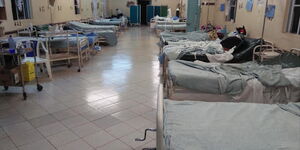According to Kenya Census Population 2019 data, over 20,000 people live on the streets. Out of this figure, 17,747 are men, while 2,348 are women. The majority of these homeless people are found in urban centers and accounted for 14,581 individuals compared to 5,520 in rural areas.
With the onset of the pandemic in 2020 and the subsequent disruption of the economy and destruction of livelihoods, this number is set to rise if no mitigation measures are put in place.
Boniface Ochieng, who lives on the streets of Nairobi, shares his experience on how he has survived for over two years.
The father of twins from rural Vihiga moved to Nairobi in 2017 seeking to better his life and provide for his then new-borns.
When he landed in Nairobi - the city of hope - the father of two landed a job at a city garbage collection company. Although he did not like the job, it gave him a better pay compared to his earnings in Vihiga.
His dream of turning around the fortunes of his family started turning into reality after one of his childhood friends hooked him up with a job at a transportation company.
The job was well paying, eventually helping him lead a better life and better that of his family back in the village.
"After arriving in Nairobi, one of my friends helped me secure a job in one of the garbage sites. In 2019, things even became better for me. Another friend of mine hooked me up with a job at a transportation company," Ochieng narrated.
However, his happiness and hopes were short-lived. On March 12, 2020, Health Cabinet Secretary, Mutahi Kagwe, announced the first case of the noble virus in the country. This is where his dreams came tumbling down like a house of cards.
A few days after the announcement, Ochieng was hit with a pay cut as companies down-sized to remain afloat.
As if this was not enough for a man who had started living his dream, he was served with a letter declaring him redundant two months later. This was as a result of the negative effects of the pandemic on the transport sector that saw night travels and inter-county movements suspended.
Ochieng states that his heart was torn into pieces, he was lost at high seas not knowing what next.
With no savings or a side hustle, Ochieng was evicted from his rented house, forcing him to start living on the streets of Nairobi's Westlands area.
Despite his predicaments, his family back in Vihiga still depended on his as he was the sole breadwinner. Bearing this in mind, he ventured into scrap metal business where he would collect pieces of metal from construction sites and other places and sell to dealers.
Boni, as he is commonly referred on the streets by his friends, was not lucky with his newly found source of hope as President Uhuru Kenyatta issued a directive banning scrap metal business.
He never lost hope. He now ventured into collecting plastics in the city and selling them to earn a living.
"The scrap metal business used to help us get good money. Now I'm living on the streets despite being a father of two. Plastic business ain't that easy at all. A good day I only earn Ksh300 and on bad days I can even earn nothing since I can't sell half a sack," he narrated.
"Every morning when I wake up, I have to go from Kangemi to Westlands to Parklands then town collecting the plastics. Somedays they are not enough to weigh two kilos."
Ochieng is now calling the President to reconsider the punitive laws imposed on the scrap metal trade, saying that many families depend on it.
"He was wrongly advised because we are the ones who have been affected by this ban. See him, he has never been under this hot sun without a meal and place to call home," noted Ochieng.
Ochieng's story represent that of many Kenyans who have been forced to live on the streets. In Kenya, the leading causes of people living on the streets are unemployment, evictions, and land grabbing among others.
Despite several intervention measures such as admissions to care homes, curbing the problem has proved a toll order with more people, especially children, pouring into the streets.
To survive, they find themselves in outlawed businesses such as trafficking and mugging.












